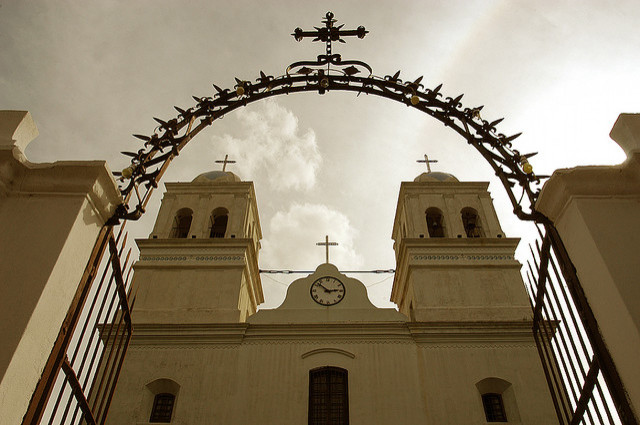After Uruguay, Why Catholicism Can’t Stop Abortion In Latin America

Uruguay just became one of the first countries in Latin America to legalize abortion, putting the left-leaning nation squarely at odds with the region’s dominant religion, Catholicism.
It was not an easy choice. Conservative Uruguayans stood opposed to the measure, but their efforts were not enough to turn the tide. The Senate approved the legislation by a 17-14 vote on Wednesday; it now awaits the signature of President Jose Mujica, who represents the parliament’s majority coalition, the leftist Broad Front.
Uruguay’s new bill, which is chock-full of compromises and caveats, shows just how complicated the abortion question can be. Legalization isn’t only about the right to life or a woman’s choice; the issue also involves health care management, governmental regulations and even economics. The Catholic Church can take a strong stand on some aspects of the issue, but not all.
In Uruguay and other South American countries, nearly all of which still outlaw abortion, the status quo may soon become untenable. At the heart of the matter is a simple fact: Laws against abortion do not stop women from pursuing them, even when it becomes dangerous.
Primed For Progress
Uruguay will soon allow women to have abortions during the first trimester of pregnancy. In cases of rape, abortion may be performed during the first 14 weeks. Later-term abortions will be permitted only if necessary to save the life of the mother.
Any woman seeking abortion must consult with three health care professionals and take five days to consider her options, and Catholic health care facilities will not be forced to perform the procedure.
Opponents have vowed to overturn the law via referendum despite these concessions, but they are unlikely to succeed.
It is not surprising that Uruguay would be one of the first South American countries to legalize abortion. (The first South American country to legalize abortion was Guyana, the continent’s only English-speaking state, in 1995. The first Latin American country to do so was the officially secular Cuba, which has paid for the procedure since 1965.)
Uruguay is a liberal society where free speech and an independent press encourage progressivity. Extensive welfare programs have long been a hallmark of domestic policy. The charismatic Mujica is famous for his proposals to legalize -- and even nationalize -- marijuana.
Catholicism is the most popular religion in Uruguay, but it is has far less influence here than in surrounding countries.
In Uruguay, according to CIA data, only 47.1 percent of the population adheres to Catholicism. In the neighboring states of Brazil and Argentina, those percentages reach 73.6 percent and 92 percent, respectively.
A Crude Operation
Can Catholicism prevent the expansion of abortion rights across South America? Not indefinitely. It is important to note that religion -- or a lack thereof -- is not the only deciding factor on this intractably complex issue.
And neither is the law, since abortions occur whether or not they are legally sanctioned.
This fact fundamentally changes the argument. Many proponents of legal abortion argue that making it official will help to regulate an already common practice, ultimately saving lives.
In Uruguay, the Broad Front made exactly this same point. Senators noted that criminalizing abortion was hypocritical, because it did not stop women from terminating pregnancies. (Official data maintain that about 30,000 women carried out abortions in Uruguay last year, but the actual figure could be much higher.)
In countries where there is no safe and legal way to terminate pregnancies, illicit abortions become a serious issue. Affluent women can typically find medical practitioners to perform the procedure secretly, but poor women have fewer options. They subject themselves to dangerous methods of pregnancy termination: injurious medication, self-inflicted abdominal trauma and extraction with crude tools.
It is this phenomenon that often spurs the legalization of abortion, since it changes the argument to hinge on women’s safety rather than the thornier issue of a fetus’ right to life.
Mitigating Mortality
Other countries in Latin America are indeed suffering the consequences of widespread illegal abortion.
According to a report from Advocates for Youth, a Washington D.C.-based reproductive health advocacy group, there were 4.2 million unsafe abortions performed in Latin America in 2008 -- 2.9 million of them were in South America alone.
These unsafe terminations accounted for 12 percent of maternal deaths in the region.
Uruguay will now be able to put an end to this scourge. Meanwhile, in neighboring countries Argentina and Brazil, the hundreds of thousands of unsafe abortions that occur every single year often result in injuries, infertility and death.
This has become a powerful impetus for the pro-choice movement all across Latin America, where debates are raging despite the restrictive presence of conservative religious institutions. Uruguay may be the first Spanish-speaking country on the continent to enact pro-choice legislation, but odds are it won’t be the last.
© Copyright IBTimes 2024. All rights reserved.






















